YouTube is in a unique position in that it gives you access to both search traffic potential and video views. Short of buying a domain name and putting out your own videos, there are several great tool alternatives that can be used to exploit the power of YouTube for keyword research if you wish to use YouTube in growing your business.
However, one may notice that YouTube itself does not rank very high on this list as it could also serve as a keyword research source all by itself. The purpose of this article is to give you an idea about alternative tools to use if you want to learn more information about keywords relevant to your business or niche.
Factors that Google use for YouTube Rankings
So let’s start with the most important question: How does YouTube rank videos? We spent some time analyzing common features among top YouTube videos. From the results, YouTube seems to be using a combination of factors when ranking videos. Let’s break it down to the major factors here:
- Views and Subscribers: The more views you have and the more subscribers you have, the better chances you have of your content ranking high on YouTube search results. But not exactly so because there are also many cases where a video with less than 1k views suddenly rank very high in the top 10 search results.
- Time on Page: How long do users watch your videos? If they stay longer than 2 minutes, then it’s another positive factor for YouTube ranking videos. The takeaway in this case is pretty straightforward: Aim at making longer, interesting videos to increase the audience engagement rates on your channel.
- Rank Brain: This is a new algorithm that Google has been testing out to find the most relevant YouTube results based on keywords searched for by users. It might use big data analytics or artificial intelligence algorithms to identify what users want when searching for specific topics. There are reports that RankBrain has been enabled for all English searches made in the U.S., has been partially enabled for searches in English made from other countries, and will be enabled for all searches globally in the future.
- Domain Authority: Domain Authority is a score that indicates how well connected or popular your website is with internet users based on data like links pointing to the site & social media popularity. Higher DA means more trusted by Google search algorithm – thus higher YouTube rankings for videos hosted on such sites. If you’re looking to use this metric to increase your ranking, you may want to manually search for backlinks to increase your DA (that’s what some content creators do). Alternatively, you may also stick to creating awesome content that your fan base will be more than interested to link back to from their sites.
- Site links to your video: This point ties to DA but it’s still worth the mention. The more relevant niche sites link to your video, the better ranking you’ll get from YouTube search results. For example: If you have image XYZ hosted at domain ABC, then it’s not really necessary that all those pages linking to it will rank well (Page Rank 3+) for videos of topic XYZ. You’d want sites that deal with images/video hosting to link to it! Google will prioritize your video rank only when you have more links from relevant websites similar to the targeted keyword topic.
- The actual search queries: For certain topics, a specific niche phrase might work better than another in YouTube search results. Sometimes it’s the opposite, too – like ranking higher in Google SERPs but not on YouTube… So YT rankings are also based on what users really type and search there, not just what you think they should be typing.
- Share Counts (comments + likes): How many people like, comment, and share on your video? The more shares you have, the better the ranking in YouTube search results for your videos! To increase your share counts, you may want to nudge your audience to share the videos if they find them helpful.
- Video Content (views on the video page itself): What is the actual content of your video? Is it the same as what you promised in the title and description box? If yes, then that’s a very positive ranking factor for YouTube videos. This is more practical because your audience will most likely watch your videos if the videos relate to their interests. If the videos are relatable and relevant, 83% of the viewers will most likely share the videos, something which will increase your DA.
- Keywords used in tags and title: What are the useful keywords used for your videos? The more you use them, the better YouTube ranking for your videos.
Top 10 YouTube Keyword Tool Alternatives
Here’s a list of the best YouTube keyword tool alternatives that can be used by both SEOs & video makers/marketers.
Tube Buddy
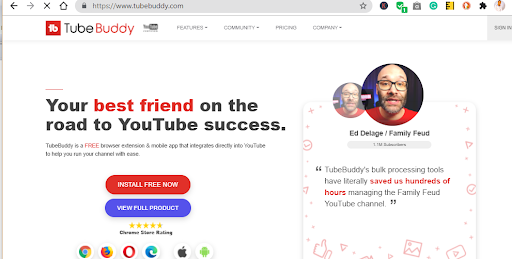
Tube Buddy includes a number of valuable features like rank checker, backlink analysis, etc., and it also has an option to export keywords to CSV files. It also allows you to filter results by date. Another great advantage over some similar tools is that you can search without even logging into their site – just add “tube” at the beginning of your keywords: For example, a search query would look like “airplane tube” or “lawnmower tube.”
Google keyword planner
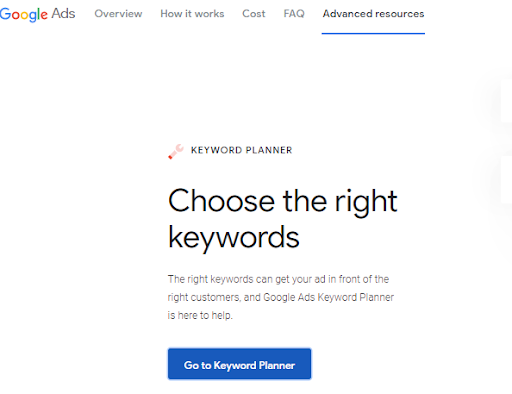
A simple yet effective tool which gives you insight into how many people are searching for a particular term on Google and approximately how much money you could potentially make if you go with PPC advertising route utilizing these terms. The best part? It also provides monthly search volume (how many times a keyword is searched per month) and potential CPC (cost per click).
Google Trends
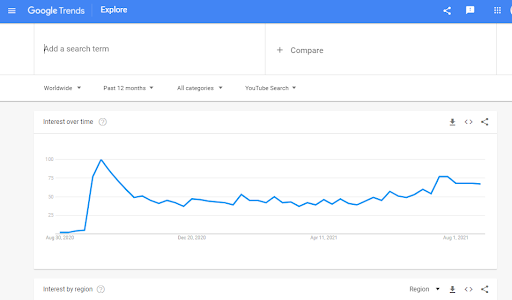
A handy tool, which gives you insight into trending topics in your country or throughout the World Wide Web. It shows you search volume for particular terms over time on Google Search, which can be helpful to identify whether a term has already peaked and is dropping in popularity or not.
Ubersuggest
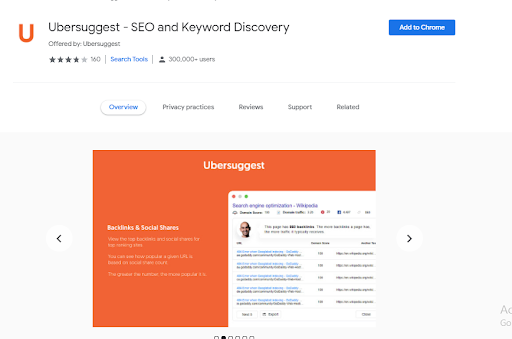
This is probably one of the best YouTube keyword tool alternatives around. It is a simple yet effective tool that allows you to find out related synonyms, geographical locations for your main keyword, including an exact number of searches in Google per month. The only disadvantage to this tool is that it has a relatively small database compared to Tube Buddy (which means you won’t find as many keywords).
VidIQ
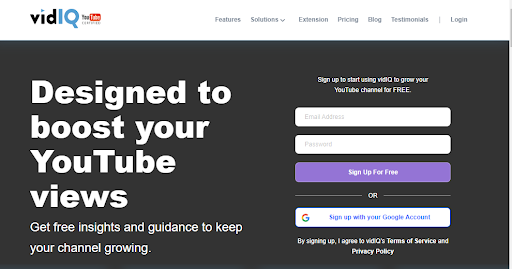
This is another one of the best YouTube Keyword Tools available online. It helps you analyze and target keywords for your videos in a super easy manner by analyzing your competitor’s video directly from their YouTube channel or website. This tool makes use of advanced machine learning algorithms to deliver video-related data like audience type, category, view retention rate, etc.
Morning Fame

This is another one of the best YouTube Keyword Tools that gives you a comprehensive list of keyword suggestions. It also offers insights through Google Trends and allows you to target long-tail keywords. This tool has several other features like keyword tracking and editing, etc., which makes it rank high among the most complete solutions for video marketers on YouTube at this moment.
Ahrefs Keywords Explorer
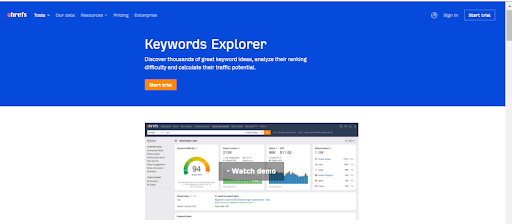
Ahrefs Keywords Explorer is a helpful and straightforward keyword research tool. It has the option to widen or shorten your range of results by setting the date you need them for, which makes it easier than other tools in terms of getting results quickly. The interface is also user-friendly, which gives you more control over selecting keywords and filtering out the irrelevant ones.
YouTube (Autosuggest)
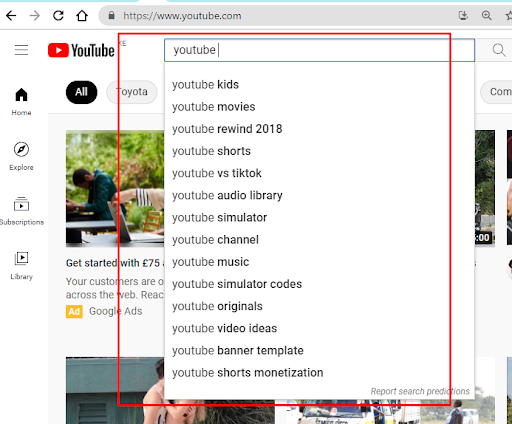
This tool is built into the YouTube platform. It recommends related keywords while typing in your query and tells you how many times a particular keyword has been searched per month. It also suggests a list of tags to use for your video, which can be very helpful.
KeywordTool.io
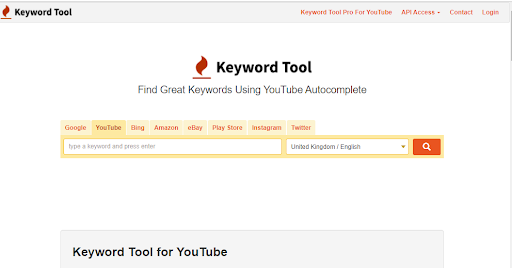
This is another one of the best YouTube Keyword Tools you can use. It has a keyword database that goes back to almost a decade ago, which means it’s got more than enough information for covering your niche in terms of competition and related topics. They also have a free plan available, but you may want to upgrade to the paid plans if you are looking for additional features.
Semrush’s Keyword Magic Tool
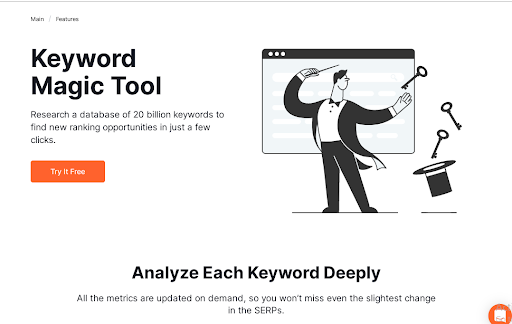
This tool helps you get new keyword ideas using Google’s auto complete feature. It also shows search volumes for each keyword and allows you to sort results by relevance and popularity. This is one of the easiest YouTube Keyword Tools out there because it doesn’t require any previous experience with keyword tools – just type in your topic or keyword and get started!
Keyword Tool Dominator
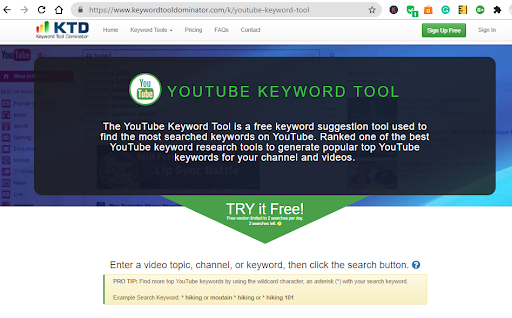
This YouTube video keyword tool is awesome because it lets you choose your preferred metric for keywords and shows search volume per country so that you can optimize your campaign internationally if needed. It has a vast database of keywords, but the downside to this tool is that you have to buy credits to access the more sophisticated features (like getting search volume data per country or category), which makes it a bit expensive in the long term.
Which YouTube Keyword Tool is the Most Accurate?
If you’re aiming at reaching and growing your audience, a typical question that would be bugging you when choosing the best YouTube keyword tool would be which keyword tool is the most accurate. Now, the right answer to this is pretty straight forward.
The most accurate YouTube keyword tool basically depends on which vertical you’re targeting. In this post, we will try to compare YouTube Keyword Tool alternatives like, SEMRush, Ahrfes, KeywordTool.io and other tools.
Bottom Line: Keep in Mind when Choosing a YouTube Keyword Tool
There are many more YouTube Keyword Tools out there that may or may not be useful depending upon the type of niche market you plan on targeting. It doesn’t make sense to use tools that aren’t good enough or don’t provide enough data because then what’s the point of paying for data if it’s not valuable enough? So, budget your time to do dig deep into the features and benefits of the tools before spending money on them.
When choosing a YouTube keyword tool, it would be best if the tool is free or have a trial version. It needs to work well, absolutely, but if it doesn’t fit your budget, that’s okay too – you might get good use out of something free anyway until you can afford a paid one.
You don’t need fancy features when starting out. Just something that gets you results, so you may want to stick with basic options before moving onto advanced options like importing/exporting data when possible. If it doesn’t do something right away, then don’t bother with it. If you can find a tool that does what you need better than another one, choose it.
You need to realize that there is NO ONE perfect YouTube keyword tool. You have to pick the ones alternative which fit your needs – there may be overlap, but you have to go with one that fits in with your style and what you’re doing. You may even need three or four different tools.
If you want to pick several different YouTube keyword tools, then it is recommendable that you pick a bunch of free ones so that there’s no investment on your part – if a tool doesn’t fit into your workflow, the best thing would be just to ditch it and try another one until you find the right one for you. The best way to get good results from a keyword tool is to try out several different ones and make a chart comparing the results.










